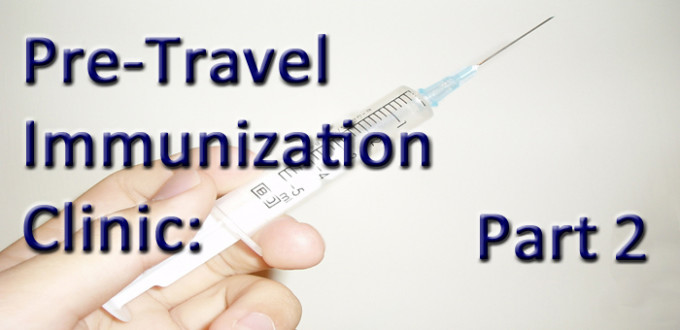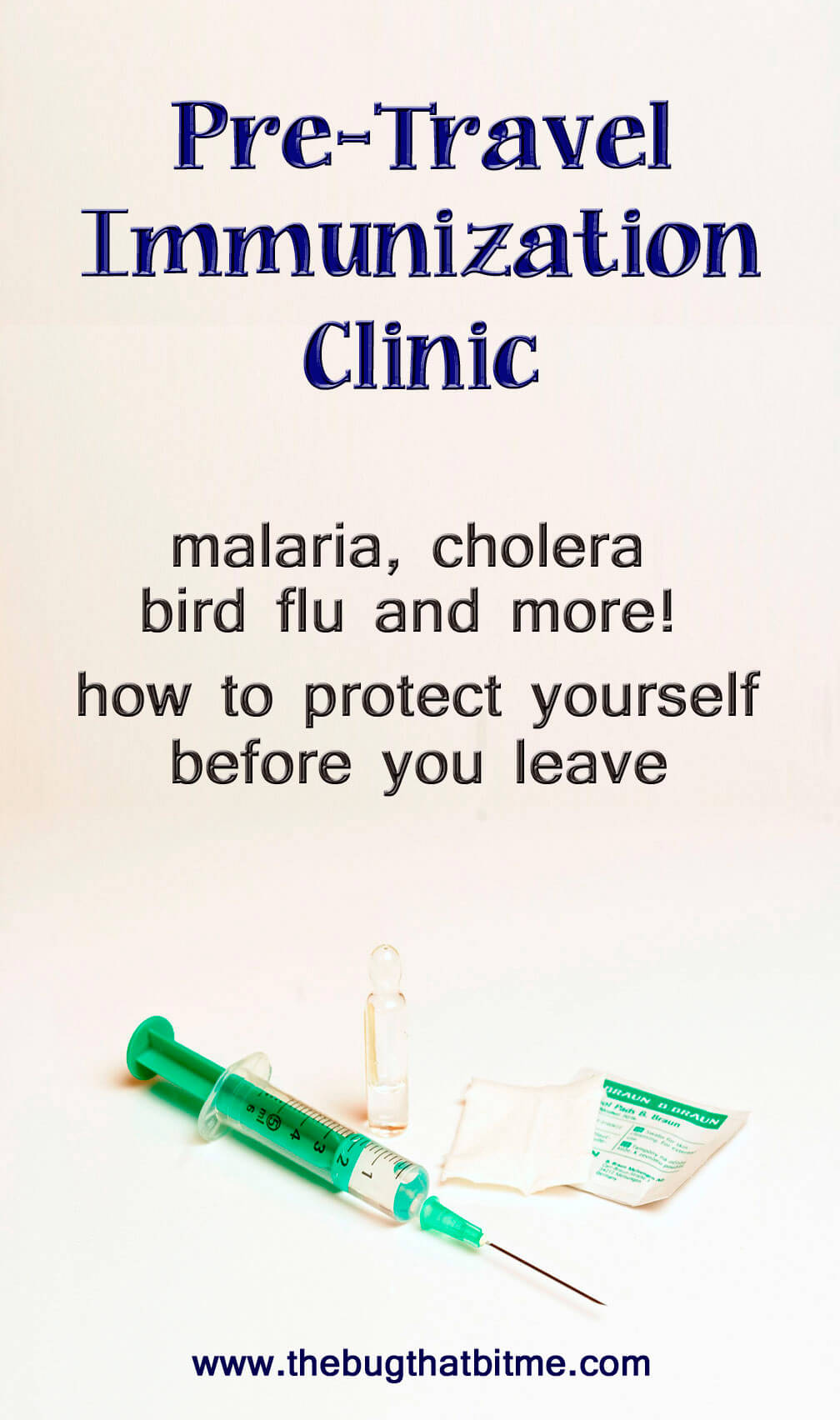Part one of my travel clinic appointment dealt with immunizations available to the traveller and where to find someone to give them to you. This post will focus on the other things that can go wrong with your health when abroad. I know everyone has their own opinions on vaccines and medications. This post is only offering a bit of information, so please, no haters!
Malaria
There is no vaccine for malaria. Treatment comes in the form of a drug taken orally, started before your trip. There are several options and the cost varies.
For Indonesia, Malaysia, Thailand and Singapore, my specialist strongly recommended malaria preventative medication as I was going to be away longer than 1 month and would be in high-risk areas.
The location of malaria mosquitos changes regularly. They are found in Indonesia, Malaysia, Thailand and Singapore, but the frequency varies with the region and time of year. Here is the CDC’s malaria map.
Malaria is transmitted through infected mosquitos, which bite from dusk till dawn. A mosquito net is recommended while sleeping. Other ways to avoid being bitten are using insect repellant, wearing clothes that cover the body, staying in an air-conditioned room. Here is a good article from the CDC on preventing all kinds of insect bites.
I have decided I would prefer not to take anti-malaria pills. I will be protecting myself from mosquito bites that can cause dengue and chikungunya anyway, so I think I will be mindful with preventative measures and skip the pills for malaria and the vaccine for Japanese encephalitis.
Cholera & Traveller’s Diarrhea – Dukoral, antibiotics, Imodium
The cholera vaccine is given orally, requires 2 doses, 0-7 days, total cost for Dukoral is about $100. Imodium costs approximately $10-30, depending on size/type of package. Antibiotics are dependent on what you get and where you get them.
Travel throughout all of SE Asia presents the possibility of traveller’s diarrhea. It was recommended to me to not only take Dukoral, but to travel with Imodium and two types of antibiotics. If I came down with diarrhea, I was told to take the Imodium immediately and give it two hours to work. If it doesn’t work within two hours, take the antibiotics. Each prescription of antibiotic will be given for a certain region. I will take whichever one coincides with the region I’m in. If the antibiotics haven’t worked in 3 days, I need to see a doctor.
This may seem a bit over-cautious, but having gotten wickedly sick in Turkey and having traveller’s diarrhea again in Egypt and Cuba, I am happy to follow her recommendation here. I got diarrhea so severe in a small town in eastern Turkey, that two Aussies we met, who happened to be doctors, took me in for two full days and tended to me. I don’t remember most of it, except for a clear vision of the squatter toilet in their room, and don’t know how I would have gotten through it without them. The other two times were just uncomfortable and slightly embarrassing and they passed, but I do not care to risk getting that sick again, especially travelling alone.
It is worth noting that Dukoral only works in 50% of cases, so having a back-up plan is a good idea.
This vaccine starts working 1 week after the last dose is taken. Protection against traveler’s diarrhea last for 3 months, but is boostable for 5 years. Protection against cholera lasts for 2 years.
Dengue & Chikungunya
No vaccine or prophylaxis exists. Prevention is all you can do. Both are caused by daytime-biting mosquitos.
Risk of exposure varies in each country, but is present in all four. Preventative measures suggested are the same as malaria.
Tuberculosis
The cost for the test is $22.60. I imagine the follow-up test will be the same.
It is recommended to get a PPD skin test status documented before leaving, and one again when you return. That way you will know if you’ve picked it up when travelling, as the symptoms can remain latent for some time.
Indonesia, Malaysia and Thailand are all in the highest-risk category for TB. Singapore poses a lower risk.
I will be getting this a month or two before I leave.
Avian Influenza
No vaccine exists.
Risk to travellers is minimal if you avoid direct contact with birds. The virus is excreted in their feces. Make sure your poultry is cooked well.
Schistosomiasis
No vaccine exists.
Low risk in distinct area of Indonesia only.
This is a nasty disease caused by parasitic worms that affect the urinary tract or intestines. The disease is spread by contact with contaminated fresh water. The hosts are freshwater snails.
Leptospirosis
Strangely, there is a vaccine, but it is only offered in a few countries.
Risk for those with extensive freshwater exposure in Indonesia, Malaysia and Thailand.
Leptospirosis is a disease transmitted by the urine of an infected animal and is contagious as long as the urine is wet. It can infect a body of water, and people who enjoy water sports are at a high risk of infection.
Between this and schistosomiasis, I think I’ll be sticking to the ocean and pools.
Hand, Foot and Mouth Disease
Malaysia has risk from February through November, with highest risk May through August; significant risk year round in Singapore; risk year round in Thailand, risk is highest from May to July. No risk in Indonesia.
This disease is considered a minor illness most of the time. It poses significant risk to children, but is infrequent in adults. Frequent handwashing is recommended.
Monkey Bites
I had to add this one just because it seemed amusing to include in a list of terrifying diseases. Turns out monkeys can carry rabies and herpes B, along with a slew of other diseases. Not so amusing after all. So no feeding monkeys! If bitten or scratched, take it seriously. Cleanse the wound as you would for a rabies-suspected bite. I’ve read quite a bit about monkeys biting travellers in Indonesia. Long sleeves and pants are recommended, despite the heat, as well as not travelling with food when going to known monkey habitats.
This is mainly an issue in Indonesia and Thailand.
Final Notes
If you have prescription benefits, it is definitely worth contacting your provider to see if any of your vaccinations will be covered by your plan. Have the DIN # ready to give them. You can get this from a pharmacist or, as in my case, the travel clinic specialist.
The remaining portion of my pre-travel clinic package offers country-specific information on a variety of subjects, from where to find a decompression chamber for divers– and suggests you call ahead to check that it’s working before diving– to terrorist activity, crime, civil unrest, road conditions, driving laws, piracy, public transportation, natural disasters FAA Advisory, currency, other laws pertinent to travellers and consular information. If you have one available, I recommend a visit to a travel clinic. Even if you decide not to get any immunizations, it never hurts to be educated.





